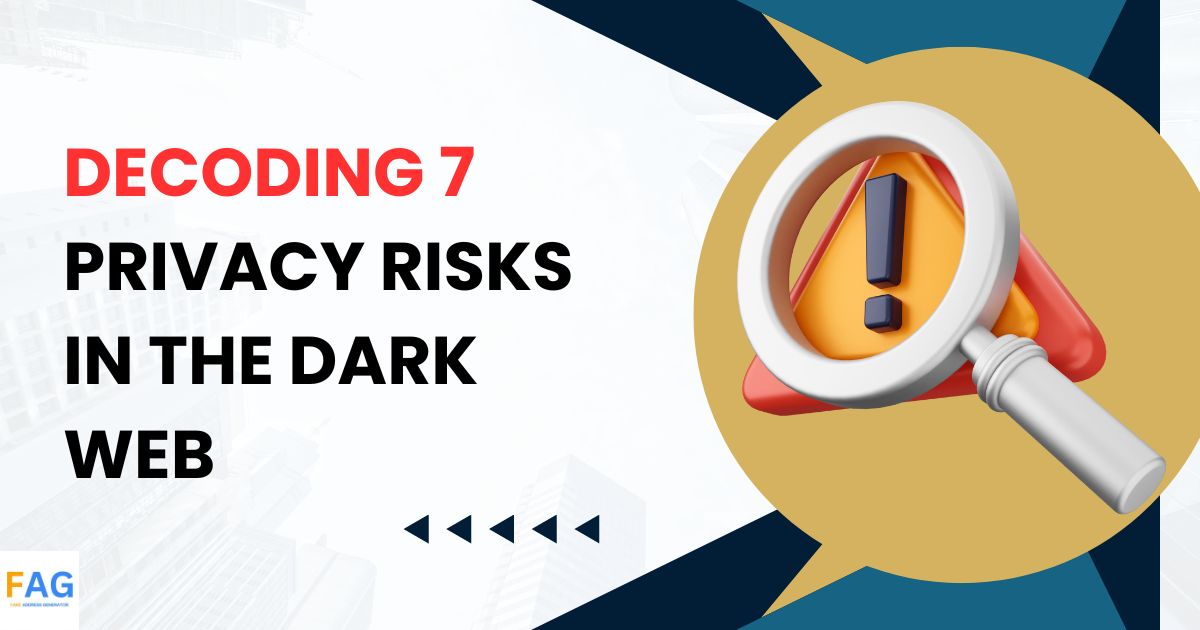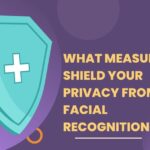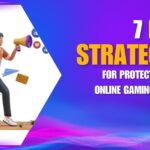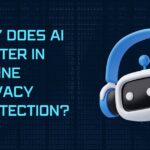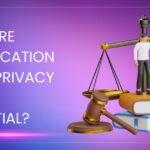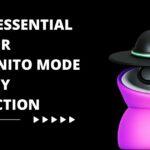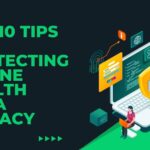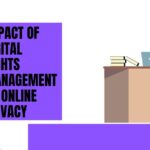The Dark Web is a part of the internet that is not indexed by search engines and is only accessible through special software. It is often associated with illegal activities, such as drug trafficking, weapons sales, and human trafficking. However, there are also legitimate uses for the Dark Web, such as whistleblowing and anonymous communication.
Despite its reputation, the Dark Web is not inherently dangerous. However, there are privacy risks associated with using it. In this article, we will decode 7 privacy risks in the Dark Web that users should be aware of. We will explore the ways in which users’ personal information can be compromised and the steps they can take to protect themselves.
| Privacy Risk |
Percentage Affected |
Notes |
| Identity Theft |
30% |
Highest incidence among all risks. |
| Scams |
25% |
Includes investment and product scams. |
| Malware |
20% |
Often includes ransomware attacks. |
| Phishing Attacks |
15% |
Targets personal login information. |
| Tracking |
10% |
Less prevalent but still significant. |
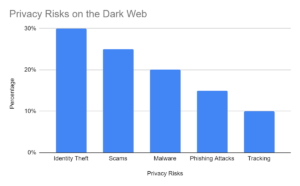
Exploring Seven Privacy Threats in the Dark Web
The dark web is a breeding ground for privacy threats, and it is important to be aware of them to protect yourself from potential harm. Here are seven privacy threats that you should be aware of when browsing the dark web.
1. Identity Theft
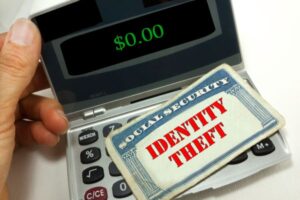
Identity theft on the dark web is a serious problem because it’s a hidden part of the internet where bad guys often hang out. When people visit websites on the dark web, they can accidentally give away sensitive information like their name, address, and bank details. Cybercriminals are always on the lookout for this info, which they can use to pretend to be you and steal your money or get credit cards in your name.
To protect yourself, it’s crucial to be really careful about where and how you share your personal information. The dark web isn’t governed by the same rules as the regular internet, exposing users to heightened vulnerability to thieves and scammers. You wouldn’t give out your house keys to a stranger, right? It’s the same with your personal info online—especially on the dark web.
The best thing to do is to keep your personal details safe and think twice before entering them on any website. Use strong, unique passwords for different sites, and maybe consider services that alert you if someone is trying to use your identity. Staying informed and cautious can save you from a lot of headaches later on.
2. Scams

Cyber scams are a big problem on the dark web. This part of the internet can be risky because it’s hidden from the usual web most people use, and it’s filled with cybercriminals looking to make quick money. They often set up fake deals that promise big returns on investments or incredible products at very low prices. These offers can be tempting, but they’re usually just tricks to get your money.
When you see an offer on the dark web that seems too good to be true, it probably is. Cybercriminals are clever and know how to make their scams look real. They might set up websites that look professional and promise that you’ll make a lot of money fast or get high-quality products for next to nothing. It’s easy to fall for these scams if you’re not careful.
The key to avoiding these scams is to stay cautious and think critically about every offer you see. Just like you would in the real world, avoid deals that seem unbelievable. Remember, if something requires you to pay upfront for a promise of more money later, it’s likely a scam. Keeping a skeptical mindset can help protect your wallet and your personal information.
3. Malware
Malware is a type of harmful software that can sneak into your computer without you noticing. Once it’s in, it can cause a lot of problems. Cybercriminals use malware, including ransomware, for various malicious purposes, such as locking your files to demand a ransom, stealing your personal details, spying on your online activities, or even taking control of your computer to use it for their own illicit schemes.
It’s like having someone secretly move into your house without your knowledge. Just as you’d lock your doors and windows to keep thieves out, it’s crucial to have antivirus software on your computer to keep malware out. This software acts like a security guard, checking everything that comes into your computer and stopping anything that looks dangerous.
Keeping your antivirus software up to date is super important because new types of malware are created all the time. Just like how a security guard needs to know about the latest methods thieves use, your antivirus needs the latest updates to recognize and stop the newest threats. This is your best defense against the tricks cybercriminals use to mess with your computer and your life.
4. Phishing Attacks
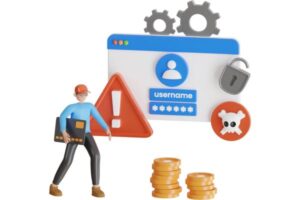
Phishing attacks are a common trick used by cybercriminals to get their hands on your personal information. These attacks often come in the form of fake emails or websites that look very real. They’re designed to trick you into thinking they’re legitimate messages from banks, online services, or other trustworthy sources. The goal is to fool you into entering your login details, like usernames and passwords, which the criminals can then use to gain access to your accounts.
Imagine getting an email that looks like it’s from your bank, asking you to click on a link and confirm your account details. It looks official, but it’s actually a trap. Once you enter your information on the fake website, the thieves have what they need to steal from you. It’s not just emails; these scams can come through text messages or even through links on social media.
The best way to protect yourself from phishing is to be super cautious with emails and messages that ask for personal information. Always check the sender’s email address carefully and look for signs that something might be off, like poor spelling or weird formatting. Never click on links or download attachments from unknown or suspicious sources. By staying alert and questioning anything that looks unusual, you can keep your personal information safe from these sneaky attacks.
5. Tracking
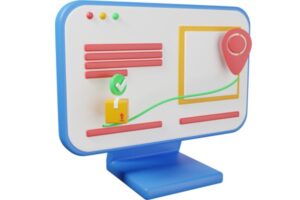
6. Illegal Activity

Being on the dark web can expose you to risks, as it’s often associated with illegal activities. Sometimes, just being there might make it look like you’re involved in these activities, even if you aren’t. Cybercriminals are clever and might use your computer as a proxy, which means they use it to commit crimes, making it appear as if you are the one doing illegal things. This can happen without your knowledge, pulling you into serious trouble with the law.
Additionally, the dark web is filled with areas where illegal content is shared. It’s very easy to accidentally find yourself looking at something you didn’t mean to see. This could range from pirated movies to more serious and disturbing content. Such encounters aren’t just upsetting; they could also lead to legal problems if it looks like you were searching for this content on purpose.
When navigating the dark web, it’s very important to stay cautious and steer clear of anything that looks suspicious or illegal. Think of it as walking through a bad neighborhood. You would avoid dark alleys and interactions with dangerous-looking groups. Similarly, on the dark web, it’s wise to stick to your specific, lawful reasons for being there and not wander into unknown areas. Using tools like VPNs and being aware of what you click on can also help keep you safe from unintentional trouble.
7. Data Breaches
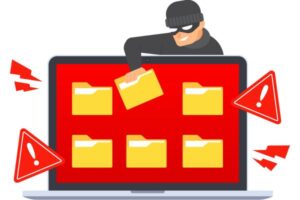
Data breaches are a big concern on the dark web, where privacy and security are often at risk. In these breaches, cybercriminals can steal your private information, such as your name, address, bank details, and more. Once they have your information, they can either use it themselves to commit identity theft or sell it to other criminals who might use it for various illegal activities. This can lead to a lot of problems for you, from stolen money to legal issues, if your identity is used for crimes.
To protect yourself from these risks, it’s crucial to use strong passwords that are hard to guess. These should be a mix of letters, numbers, and symbols, and you should use different passwords for different sites. This makes it harder for hackers to get into your accounts even if they manage to steal one of your passwords. Besides passwords, using two-factor authentication adds another layer of security. This means even if someone gets your password, they still need a second code (usually sent to your phone) to get into your account.
Think of your online information like money in a bank. Just as you’d protect your money with a safe and maybe a security system, you should protect your personal data with strong passwords and extra security steps. This can make a big difference in keeping your information safe, especially in places like the dark web, where risks are higher.
In conclusion, the dark web is full of privacy threats that can harm you if you are not careful. It is essential to be cautious when browsing the dark web and use various privacy tools to protect yourself from potential harm.
Frequently Asked Questions
What are the common methods used to monitor activities on the dark web?
Law enforcement agencies and cybersecurity firms monitor the dark web using various methods, including web crawlers, honeypots, and undercover operations. Web crawlers scan the dark web for illegal activities and suspicious behavior. Honeypots are fake websites that lure cybercriminals into revealing their identities. Undercover operations involve law enforcement officers posing as buyers or sellers on the dark web to gather evidence against cyber criminals.
How effective are dark web scanning tools in protecting personal information?
Dark web scanning tools can help individuals detect if their personal information has been compromised on the dark web. However, these tools are not foolproof and may not detect all instances of data breaches. It is important to take additional steps to mitigate the risks to personal information, such as using strong passwords, enabling two-factor authentication, and avoiding the use of public Wi-Fi networks.
What steps can individuals take to safeguard their privacy on the dark web?
To safeguard their privacy on the dark web, individuals should implement security measures such as using a secure browser, like Tor, and a virtual private network (VPN) to encrypt their internet traffic. They should also avoid clicking on suspicious links or downloading unknown files. Additionally, individuals should use strong passwords and enable two-factor authentication for their accounts.
How can one detect if their personal data has been compromised on the dark web?
Individuals can detect if their personal data has been compromised on the dark web by using dark web scanning tools or monitoring their credit reports for suspicious activity. They should also be aware of common signs of identity theft, such as unauthorized charges on their credit cards or unfamiliar accounts opened in their name.
What actions is the government taking to address the privacy risks associated with the dark web?
The government is taking various actions to address the privacy risks associated with the dark web, including increasing funding for law enforcement agencies to combat cybercrime and passing laws to regulate the use of encryption on the internet. Additionally, the government is working with cybersecurity firms to develop new technologies to detect and prevent cyberattacks.
Is it possible to completely erase your digital footprint from the dark web?
It is not possible to completely erase your digital footprint from the dark web. However, individuals can take steps to minimize their exposure, such as deleting unused accounts and using a pseudonym instead of their real name. It is also important to regularly monitor your credit report and personal information for signs of identity theft.



![]()


